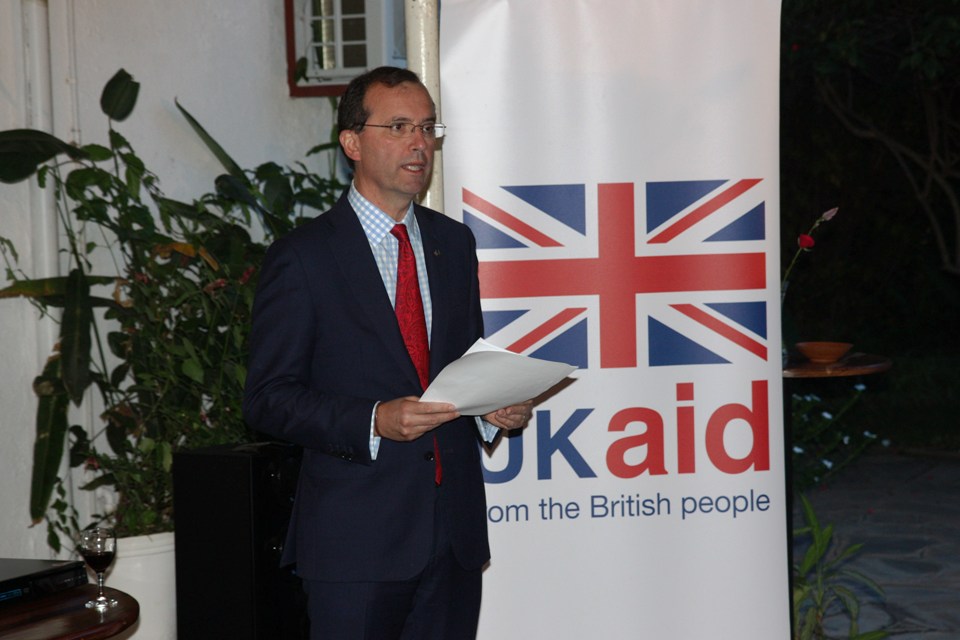British High Commission in Lusaka celebrates International Women's Day
Ahead of International Women’s Day on 8th March, British High Commissioner Fergus Cochrane-Dyet hosted an event at the Residence.

I am pleased to host this event, here at the British Residence, anticipating this Wednesday’s International Women’s Day. We are due to hear from our guest speaker, watch a couple of short videos, and hold a short panel discussion. You will then have earned the chance to mingle over some drinks and snacks.
Foreign Secretary, Boris Johnson, on 27 February addressed an audience of 350 key policy makers at a reception at the Foreign Office in London, ahead of International Women’s Day. The UK’s chosen theme this year is leadership and empowerment. He announced a new Special Envoy for Gender Equality, Joanna Roper. Joanna will spearhead the UK’s efforts to deliver a coherent international approach to ensuring the rights of women and girls, working closely with Whitehall departments, civil society, academics, and other governments.
The Foreign Secretary spoke of his personal commitment to addressing gender inequality in all its forms. He argued in particular that unequal access to education, itself flowing from gender prejudice and discrimination was a major barrier to women’s empowerment.
Speaking at the event, the Foreign Secretary said:
The sombre truth is that today 61 million girls between the ages of 6 and 14 do not have the chance to go to school. They have the same right to an education as anyone else – and at least as much potential and ability – but too many girls in too many countries endure the supreme injustice of being denied the opportunity to attend school.
If you want to increase prosperity; stabilise population growth; improve child nutrition; and reduce child marriage, the single most effective remedy is to ensure that all girls go to school.
I hope that every national leader will wake up to the benefits - and the essential justice - of educating the daughters of their country just as surely as they educate their sons.
Justine Greening, Minister for Women and Equalities, described the continuing efforts to promote gender equality in the UK. We now have record numbers of women in work, and we have more women than ever before on the boards of the UK’s top companies. By marrying up the domestic and international aspects, she said, we can showcase UK leadership in this field giving us greater credibility to encourage like-minded partners around the world.
Here in Zambia, it is important to stress that addressing these issues is not only the morally right thing to do. It makes economic sense too. Estimates indicate that up to $28 trillion could be added to the global economy if women took their equal place in the economy. Addressing inequality is not a “nice to have”, or an “add on” to our core work; it is firmly in the UK national interest – and in Zambia’s - and so is central to good policy and programming. Empowering women and girls improves peace and stability, good governance, economic growth and poverty reduction.
The relevant Global Goal for Sustainable Development is Goal 5, to ‘achieve gender equality and empower all women and girls’. This contains targets to end harmful practices such as Violence Against Women and Girls, Female Genital Mutilation, and Child and Early Forced Marriage. The UK played an instrumental role in advocating for, and achieving this goal and targets. We are now committed to playing our part in ensuring that the commitments made to the SDGs are delivered upon.
Through UKAid we are backing this aspiration with practical support. For example, in 5 years to March 2016, UKAid:
- Supported 5.3 million girls in primary and lower secondary education;
- Helped to save the lives of 103,000 women in pregnancy and childbirth;
- Improved access to financial services for over 36 million women.
In Zambia, the UK is proud to work in partnership with the government, civil society and business, to support women reach their potential, thrive in business and politics, and take their place as leaders who champion Zambia’s development.
We work with the Ministry of Gender to improve women’s leadership in politics and the public sector, and to challenge attitudes and behaviours that limit women’s development. We also work with the private sector to increase opportunities for women to get decent jobs, to thrive as entrepreneurs with increased access to finance and business know-how.
This collective effort is starting to pay off. The 2016 election saw an increase in the number of women elected as MPs and Councillors, and we are joined this evening by women who have demonstrated leadership in public service, business and voluntary sectors.
Whilst much has been achieved, and tonight is an opportunity for us to come together and celebrate this great progress, there is still much more to be done. Almost half of Zambian women have experienced violence in their lifetime; high rates of child marriage and teenage pregnancy contribute to high dropout levels in secondary education; women are less likely to own land; and they find it harder to get access to finance. When women are able to overcome these barriers, they are still so often met with the message that certain careers are not for them, that their role is in the home, and that they cannot be successful in their ambitions.
The women here this evening are testament to the fact that this is not the case, and serve as great role models for the next generation of girls who will have a vital role to play in securing Zambia’s equitable economic development.